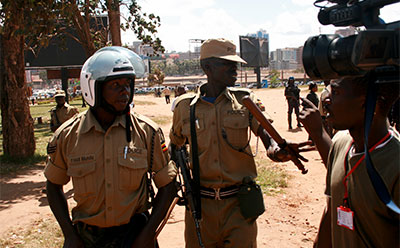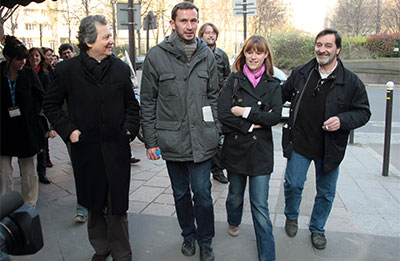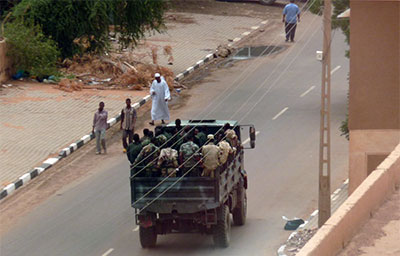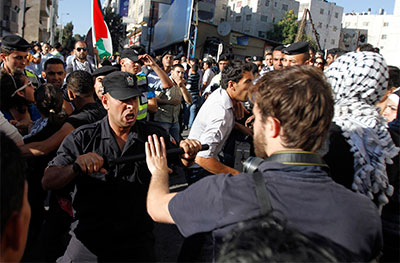
Ugandan press finds unexpected ally in judiciary
With a medical drip attached to his hand, camped outside police headquarters along Parliamentary Avenue in Uganda’ capital, Kampala, William Ntege was determined to get his video cameras back. Police had beaten Ntege, a journalist with the private broadcaster WBS, and damaged two of his cameras as he covered elections last year, according to local…
Blogger harassed, briefly detained by police in Vietnam
Bangkok, July 6, 2012–Vietnamese authorities must stop their harassment of independent blogger and rights activist Huynh Thuc Vy and allow her to report freely, the Committee to Protect Journalists said today. Huynh was briefly detained by police and threatened with anti-state charges on Wednesday, according to news reports.

Victory for press freedom in Sarkozy video case
“Champagne.” Augustin Scalbert’s tweet on Monday could not have better expressed the joy and relief at Rue89, a leading French news website. After four years of legal procedures, a Paris judge had just announced he was dropping all charges against the journalist “for lack of evidence” in a case that was seen as a litmus…

Sudan must end crackdown on press covering protests
New York, July 3, 2012–Sudanese authorities should allow journalists to cover anti-government demonstrations in Khartoum, the Committee to Protect Journalists said today. Over the past week, authorities have raided a media office and a journalist’s home, arrested one journalist and interrogated another, deported a third journalist, and blocked at least three critical websites.

Palestinian security forces assault journalists at protests
New York, July 2, 2012–The Committee to Protect Journalists today condemned attacks by Palestinian security forces on at least four journalists who were covering protests against the Palestinian Authority in Ramallah on Saturday and Sunday, according to news reports.

In Belarus, journalist charged with libeling Lukashenko
New York, July 2, 2012–Andrzej Poczobut, the prominent Grodno-based correspondent for the largest Polish daily Gazeta Wyborcza, was formally indicted Saturday on criminal charges of libeling President Aleksandr Lukashenko through a series of articles critical of administration policies.
Sri Lankan police raid offices of two news websites
New York, June 29, 2012–The Committee to Protect Journalists calls on authorities in Sri Lanka to immediately stop harassing news outlets. Police in Colombo raided the offices of two opposition news websites today, arresting nine people and confiscating equipment, according to news reports.
Journalists imprisoned, threatened in Belarus
New York, June 26, 2012–Belarusian authorities should immediately release a critical journalist who was tried, convicted and sentenced to prison in a single day on a vague charge of hooliganism, the Committee to Protect Journalists said today. In an unrelated incident, a Belarus correspondent for the independent Moscow-based newspaper Novaya Gazeta received a threatening package…

Journalist in the Gambia detained beyond legal limit
Abuja, Nigeria, June 25, 2012–The Committee to Protect Journalists calls on the Gambian authorities to immediately release or charge a journalist who has been in detention without charge longer than the country’s limit of 72 hours. Abdulhamid Adiamoh, the managing editor of the Today newspaper, was arrested Wednesday in connection with an opinion article, “Counsel sidesteps…
In Azerbaijan, editor jailed on drug possession charges
New York, June 25, 2012–Authorities in Azerbaijan must drop the charges against journalist Hilal Mamedov and immediately release him, the Committee to Protect Journalists said today. Mamedov is the eighth journalist jailed in Azerbaijan, according to CPJ research.